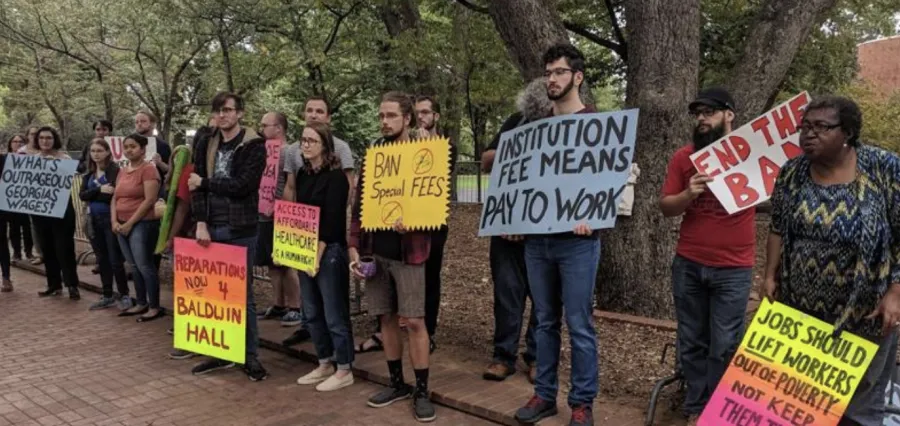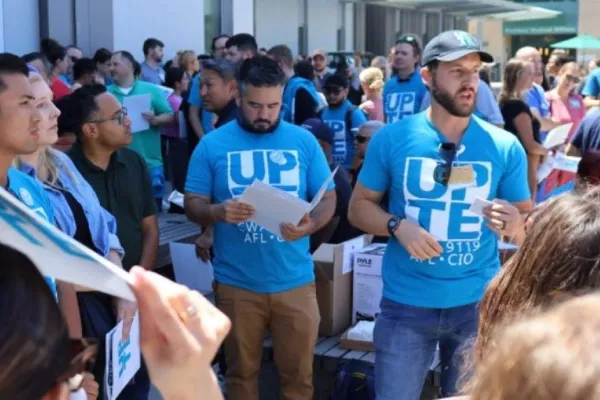The Fight Continues: Graduate Students And Fees in Georgia

April was a big month for UCWGA graduate students. It marked the culmination of year-long, statewide efforts calling for the repeal of the Special Institutional Fee (SIF), which was instituted as a temporary fee after the 2008 financial crisis. Since removing the sunset clause that would have let the SIF die a natural death in 2012, the Board of Regents has voted to keep the SIF every April. The SIF is the largest individual fee and partially funds graduate teaching and research assistantships. In short, graduate students are paying to work. Regents met April 14-15 to determine fees for the 2020-2021 academic year. Graduate students attended the virtual session, but were not allowed to talk, and the BOR voted to keep the SIF with no discussion.
Last fall, graduate students sent letters and petitions to the Board of Regents and university administrators and organized a rally during the October BOR meeting in Athens. Members of the UCWGA Graduate Student Committee at UGA subsequently met with representatives of the Board of Regents and corresponded with UGA’s Interim Dean of the Graduate School about repealing the fee. In response to these efforts, the Chancellor of the Board of Regents organized a special committee to study student fees and consider changes.
At the start of this year, graduate students joined other University System of Georgia employees at the Georgia Capitol to lobby for fair wages, cost of living adjustments, and the repeal of the SIF. Our grad fee bill was scheduled for a Senate Higher Education Committee hearing in early March, but the hearing was delayed in response to the COVID-19 pandemic. Nevertheless, graduate students have not relented. UGA graduate workers sent personalized letters detailing the SIF’s impact on their financial wellbeing to individual members of the Board, and UCWGA Graduate Student Committees at UGA and Georgia Tech sent general letters to the Chancellor detailing our demands. We have also aided in securing resolutions of support from other graduate student organizations, faculty, and administrators across the university system. These efforts and successes preceded us at the Board of Regents meeting.
Similarly, COVID-19 has not hindered graduate student efforts and actions surrounding the USG response. Graduate students joined other UCWGA members in calling for greater equity and compassion for all employees and students during the crisis. In particular, graduate students have called for clearer, more assuring communication with students regarding campus housing. We have also condemned workplace abuses related to the transition to online learning, initiating reconciliatory conversations between graduate students and offending parties and administrators. Resulting from these efforts was a formal apology from an offending administrator as well as a dialogue regarding graduate worker involvement in policy decisions.
Since our last update, state budget officials ordered all state agencies, including the USG, to cut 14% from their budgets for FY21. Graduate students have continued to pressure the BOR and administrators regarding the SIF, but COVID-19-related revenue losses and budget cuts have placed another barrier in front of us. Still suffering from the effects of the Great Recession, graduate students have demanded no cuts to graduate stipends and no further increases in student fees. We made this demand along with others in our recent press release calling for compassion in making cuts. Additionally, Bryant Barnes (grad committee chair) and Robyn Waserman (UCWGA-UGA Co-chair) authored an Op-ed in the Athens Banner Herald calling for a federal higher education bailout to ease the strains on universities and their essential employees caused by the crisis.
The Graduate Committee is not hopeless, though, and our passion has only been further kindled. While the economic crisis is sure to slow our progress, we feel that the mandated budget cuts provide an opportunity for university administrators and the BOR to finally take a stand against the decades-long shift of higher education costs from the state onto students. We have asked administrators and regents to join us in this fight repeatedly. Perhaps now that they are hurting as well, they will realize that our demands are right and fair.
Georgia public universities’ ‘return to office’ mandate may spark exodus

